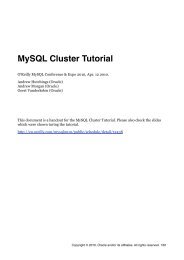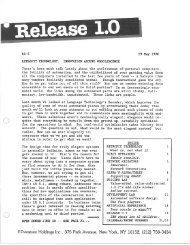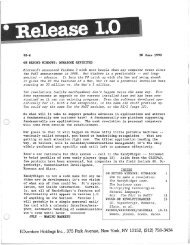Programming Grails - Cdn.oreilly.com
Programming Grails - Cdn.oreilly.com
Programming Grails - Cdn.oreilly.com
You also want an ePaper? Increase the reach of your titles
YUMPU automatically turns print PDFs into web optimized ePapers that Google loves.
def strings = []<br />
but when the right side is a method invocation, I’ll type the left:<br />
List strings = someMethod('Hello', 'Groovy', 'World')<br />
and I often add the generic type even though Groovy ignores it—again as a selfdocumentation<br />
practice and not because it has any other runtime effect. The same goes<br />
for the return type and parameter type(s) of methods; if it’s void, I specify void some<br />
Method(...) instead of def someMethod(...), so the caller knows that there’s nothing<br />
being returned.<br />
each is a convenient way of looping, but I rarely use it, because it has almost no benefit<br />
over the for/in loop. For example, I would use:<br />
for (string in strings) { ... }<br />
instead of:<br />
strings.each { string -> ... }<br />
because they’re equivalent, basically the same number of characters, and both are nullsafe.<br />
And the for loop has the benefit that you can break out of it if there’s a reason to<br />
stop looping, whereas each cannot, because returning from the closure that you pass to<br />
the each method returns from the closure, not each.<br />
Of course, these are arguments about preferences—there’s no right or wrong here. And<br />
I will certainly drop the type of a method parameter if it makes testing easier by letting<br />
me substitute a more convenient value that uses duck typing.<br />
Closures Versus Methods<br />
Another example of being “too groovy” is using a closure as a method where you don’t<br />
use any features of the closure. If you don’t set the delegate or use any other closurespecific<br />
feature, then there’s no reason to use:<br />
def foo = { -><br />
...<br />
}<br />
instead of:<br />
foo() {<br />
...<br />
}<br />
and, in fact, using the method has the not-insignificant benefit of letting you specify the<br />
return type. Plus, things like AOP and method proxying that aren’t Groovy-aware won’t<br />
work at all with closures, because they’re only treated like methods by Groovy—they’re<br />
just public fields and are ignored by Java.<br />
32 | Chapter 1: Introduction to Groovy

















